DAVE'S DIARY - 10/8/ 2015 - MARY CHAPIN CARPENTER INTERVIEW
2000 INTERVIEW
CARPENTER CHISELS HITS FOR PEERS
“Weren't we something back then, thick as thieves/ who would have ever thought that you and me/ would let forever come to Used to be/ Well, I lit a candle, it's burning still/ most every night on my window sill/ where are you now?” - Where Are You Now - Mary Chapin Carpenter-Trisha Yearwood.
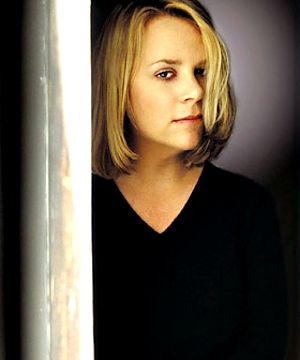 |
She wrote the second single from Trisha Yearwood's huge selling ninth album and has another original tune a new disc by Canadian chanteuse Terri Clark. Although Mary Chapin Carpenter is best known for cutting her own tunes she still gets a buzz from hearing peers covers her music. “It's thrilling to me that others find something in what you say to connect to,” Mary Chapin told Nu Country in a call from New York where she performed at a Joni Mitchell tribute show. Carpenter and her semi-acoustic trio, featuring long time guitarist-producer John Jennings and pianist John Carroll, perform The Palais Theatre on April 19, 2000, as a prelude to Byron Bay Blues festival. |
Mary Chapin, 42 and third of four sisters born in Princeton, New Jersey, had her tunes covered by artists diverse as Joan Baez, Maura O'Connell and fellow Joni tribute shoe guest Wynonna Judd who cut the raunchy Girls With Guitars.
But it's Where Are You Now , a tune she wrote with Ohio born Kim Richey that is likely to be her biggest earner after being cut by Georgian Trisha Yearwood on her ninth album Real Live Woman.
Mary Chapin is ecstatic her tune follows the Bobbie Cryner title track - a hit - as second single for the former singing spouse of Mavericks bassist Robert Reynolds.
“We wrote it three or four years ago when we were all touring together,” Carpenter recalled.
“It was just one of the songs we came up with. It was a great opportunity to write. It was fabulous Trisha cut the song. When they called me I said ‘what song did she cut, when did I write that?' It was a thrill, it's her next single - I think she's a fantastic artist and I would say that even if she wasn't singing my songs.”
Also a financial pleasure is the news that Canadian chanteuse Terri Clark has included a Carpenter song on her pending fourth album.
So what was the song?
“Oh gosh, why are you asking me this?” Carpenter said as she swerved over a mental blank.
“I guess it was just a song that felt right to pitch to other people. I write a lot of songs that I don't sing. I don't feel obligated to be the purveyor of everything I write. There's not that many, that's why it's such a thrill.”
Carpenter may have reduced co-writing chances by living in her own retreat in Washington D C. but she recently benefited from partnerships with successful songsmiths Beth Neilsen Chapman and Annie Roboff.
“We wrote Almost Home which made the Top 20 here,” the singer revealed.
“There's another song we finished that hasn't been cut yet.”
Almost Home was one of the new songs on Mary Chapin Carpenter's “greatest hits” - her eclectic 17 track seventh album, Party Doll And Other Favorites - on which she defied tradition with inclusion of alternate versions of her chart toppers.
One of the live tracks - Can't Take Love For Granted - was recorded on the David Letterman Show and her smash hit Down At The Twist And Shout , featuring Beausoleil , was cut at the Super Bowl in New Orleans in 1997.
Quitting Time dates back to a live show at the historic Ryman Auditorium in Nashville in 1994, I Take My Chances was cut at the Barrymore Theatre in Madison, Wisconsin, in 1998, and The Hard Way was part of a PBS special.
Stones In The Road , also covered by Baez, was culled from a live acoustic show at Her Majesty Theatre in London in 1994.
The covers include the Mick Jagger title track, John Lennon's Grow Old With Me and the traditional 10,000 Miles from the movie Fly Away From Home.
WHEN HALLEY CAME TO JACKSON
“Late one night when the wind was still/ daddy brought the baby to the window sill/ to see a bit of heaven shoot across the sky the one and only time Daddy saw it fly/ it came from the east just as bright as a torch/ the neighbors had a party on their porch /Daddy rocked the baby, Mother said amen /When Halley came to visit in nineteen ten.” - When Halley Came To Jackson - Mary Chapin Carpenter.
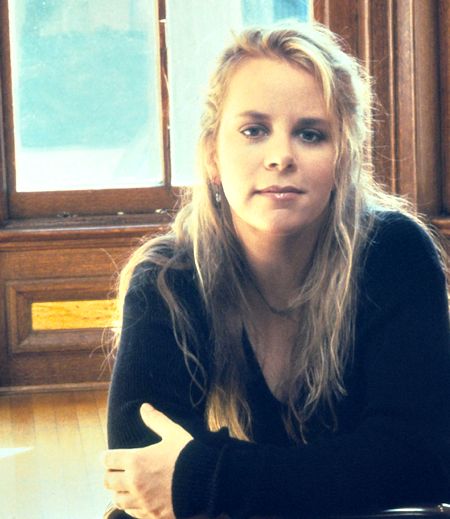 |
And the song Dreamland takes its title from the first of two children's books, whose proceeds go to charity, penned by the singer.
Dreamland (1996) and When Halley Came To Jackson (1998) was also spawned by an original tune from Carpenter whose recording career began in 1987 with Hometown Girl.
But another of her side projects - a musical version of historic western movie Shane set in the 19th century - stalled at the barrier.
“We could never seem to agree on terms for commencing work on it,” she recalled.
“It took a couple of year to keep the ball rolling but we couldn't agree on the legalities. I then went onto other work.”
Mary Chapin cut State Of The Heart in 1988 - it produced Never Had It So Good and Quitting Time.
Shooting Straight In The Dark (1990) spawned her huge hit Down At The Twist And Shout that preceded her low key debut Australian tour with Rosanne Cash and Lucinda Williams - author of her post tour smash, Passionate Kisses .
The singer has now sold about 10 million albums after scoring seven hits from Come On Come On in 1992, Stones In The Road in 1994 and A Place In The World in 1996.
But it was an early morning drama, during her 1991 Aussie tour, which had the most dramatic effect on her lifestyle.
The singer suffered a panic attack, blacked out and forgot the second verse of embryonic hit This Shirt on breakfast TV show Good Morning Australia.
“It felt like a rug had been pulled away from underneath me," she revealed.
"It was like I'd woken up that morning and this thing that I'd been doing all my life had suddenly been taken away from me. It was such a nightmare, a complete blackout. It was a terrible experience. Ironically it was something of a catalyst because it really helped me realise I needed to find some professional help for stage fright. So I've been working on it over the years. I'm pretty casual about asking for the tele-prompter.”
Although the singer has won a swag of Grammys, CMA and Academy Of Country Music Awards she has no delusions about stardom and longevity in a business that spits out its heroes and heroines with no regard for talent.
“I consider myself very fortunate the way things went the way they did,” says the singer.
“I feel every time I get up on stage and play for people it's a privilege. I never want to take it for granted.”
Lyle Lovett is one of the few singer-songwriters who emerged at the same time as Marcy Chapin to survive on major labels.
Steve Earle, Nanci Griffith, Rosanne Cash, Rodney Crowell, Lucinda Williams and many of her other more literate peers have retreated to indie labels.
So have Matraca Berg, Gretchen Peters and Bobbie Cryner who also rely on songwriting royalties.
She is also thankful Australian fans have been loyal.
“It was a great time when I first toured there,” she recalled, “it was wonderful to be with Rosanne and Lucinda, what a great way to come to Australia .”
Carpenter follows the Dixie Chicks - who also fought to play their own instruments on their discs - into the Palais on April 19.
2010 CD REVIEW
MARY CHAPIN CARPENTER
THE AGE OF MIRACLES (ROUNDER-DECCA)
MRS HEMINGWAY, I PRESUME
“Living in Paris, in attics and garrets/ where the coal merchants climb every stair/ the dance hall next door is filled with sailors and whores/ and the music floats up through the air/ there's Sancerre and oysters, cathedrals and cloisters/ and time with its unerring aim/ for now we can say we were lucky most days/ and throw a rose into the Seine.” - Mrs Hemingway - Mary Chapin Carpenter.
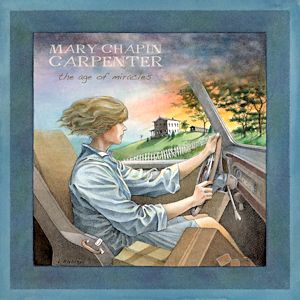 |
Mary Chapin Carpenter has good reason to believe in the title of her 10th album. Carpenter, now 52, survived a life threatening pulmonary embolism in the spring of 2007 with help from doctors and husband Tim Smith. So it's no surprise the five-time Grammy winner writes of her resurrection and reflects on the journey in 12 new songs. Ironically, the disc she produced with pianist Matt Rollings was released exactly three years after her hospital discharge. But these songs - equally about freedom, suffering, resilience and regret - enjoy delivery soothing as her sentiments. |
Salient sequencing from entrée We Travelled So Far and marital sibling I Put The Ring Back On to finale The Way I Feel is a bonus.
Vince Gill joins Carpenter as she sings: “who knows where faith comes from/but last night I put my ring back on.”
I Was A Bird, featuring Alison Krauss, Holding Up The Sky, What You Look For, Iceland and the title track are personalised pit stops providing sweet solace.
In the latter she references Greenland melting, moon landings, Hurricane Katrina and Burmese Buddhist Monks self-immolation before finding her own spirituality in Zephyr.
But old-fashioned research from books and newspapers fuelled two vast contrasts in love and war.
A New York Times article sourced 4 June 1989 - the story of Tiananmen Square soldier Chen Guang who became a dissident artist.
Ernest Hemingway memoir A Moveable Feast provided impetus but other books a punch-line for rebound of first spurned spouse Hadley Richardson in Mrs Hemingway .
Hemingway dumped Hadley for her best friend in gay Paris but she found love in the arms of her second husband - a diplomat.
What You Look For is an optimistic observation of life in a bleak world, punctuated by personal reflection - it boomerangs to waves of sunshine for humanity.
Here is an artist at her peak, kissing Americana charts - a third Australian tour would prime the sales pump.
2007 CD REVIEW
MARY CHAPIN CARPENTER
THE CALLING
MARY CHAPIN FINDS CALLING WITH DIXIE CHICKS
“This isn't for the ones with their radio signal/ calling for bonfires and boycotts they rave/ exhorting their listeners to spit on the sinners/ while the counting the bucks of the advertising they'll save.” - On With The Song - Mary Chapin Carpenter
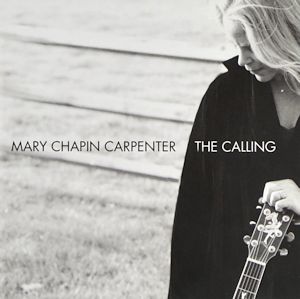 |
Mary Chapin Carpenter believes in serendipity and karma - now she also has timing on her side. When the five-time Grammy award winning singer-songwriter wrote On With The Song - her vitriolic parody of U.S. radio for banning the Dixie Chicks - her heroines had stalled on the sales charts. But by the time Carpenter's 11th album The Calling was released their five new Grammys triumph ignited 153,000 album sales in two weeks. Many U.S. stations still ignore Dixie Chicks but, like Carpenter, they use TV as a surrogate radio. |
Carpenter appeared on the U.S. Today show to promote her disc highlighted by her social comment in the impact on Houston by families displaced by Hurricane Katrina.
And the singer, who toured here twice, nailed it with the lines “never been to Texas / hope this bus is on a tear/ never seen The President/ maybe he will meet us here.”
This is a concept album of sorts with Carpenter taking listeners on a deeply personal journey from questions of faith on a dark title track entrée to anthemic Why Shouldn't We and triumph in finale Bright Morning Star .
Along the way she buries the past with broken halo in her hands and revels in freedom of fate in We're All Right and metaphorical Twiligh t.
A joyous journey, massaged by healing in dreams, finds expression in superb imagery of It Must Have Happened .
“I can't remember rowing towards the moon upon a single beam/ but it must have happened.”
Carpenter, 48, maximised power of love - positive in Your Life Story and On And On It Goes and pain in Closer And Closer Apart and Leaving Song .
It's the second album she produced with Matt Rollins who also plays piano, B3 and accordion.
2004 CD REVIEW
MARY CHAPIN CARPENTER
BETWEEN HERE AND GONE ( COLUMBIA ).
CARPENTER JOINS CONTRACTOR ON JOURNEY
“Now Hercules is staring down at me/ next to him is Minerva and Mercury/ I nod to them and start my crawl, flyers covering every wall/ faces of the missing all I see.” - Grand Central Station - Mary Chapin Carpenter.
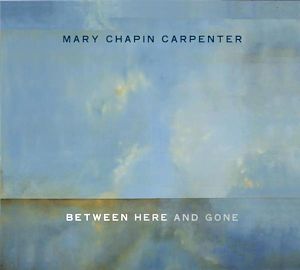 |
When Mary Chapin Carpenter wed contractor Tim Smith there was no danger she would become a generic Mary Smith. The five-time Grammy award winner-author proved a unique talent on two Australian tours. Her country folk hybrid enabled her to outshine better-known Rosanne Cash and Lucinda Williams on her first visit in 1991. But she “corpsed” on Good Morning Australia and later had therapy for panic attacks. Now, 12 years later, Carpenter has belatedly released 10th album Between Here And Gone - a snapshot of her journey laced with tasty pedal steel, mandolin and dobro. |
The title track was inspired by the 2002 Massachusetts hotel room heart attack death of folk singer Dave Carter, 49, of the duo, Dave Carter & Tracy Grammer.
"His songs were visionary to me," says Carpenter who produced this with pianist Matt Rollings.
"There is no one who wrote like he did. And when I heard he had suddenly passed away, I was just devastated. I couldn't take it. That song is about the notion that one moment of beauty, of love, of genuine contentment, is still so perfect it's enough. And the latter part of that song is about facing that darkness, of realising it's not something to fear."
Carpenter, living in the Blue Ridge Mountains, says the theme - sequel to concept disc Time, Sex, Love - is the journey from "the street of broken dreams” entrée What Would You Say To Me .
"I wrote them very much as a 45-year old woman who has lived a life,” Carpenter said.
“It's about the journeys and moving and lots of demons there I don't think the album is melancholy. It's about taking stock of the times we live in, about authenticity.”
Former partner-producer John Jennings plays guitar here but she credits Smith for the inspiration.
She wrote finale Elysium - a song of hope - about a drive she and Smith took on the first day they met and fell in love.
“River is just me trying to find my way in this new relationship,” she added, “"I didn't think I would ever meet anybody who could put up with me or I would like enough. I love my husband so much, and that's the difference between relationships I have had and this commitment to marriage. Learning how to fight is hard work. When things get tough, I'm like, 'I don't need this! I'm gone!' In fact, I've written about this in my songs. So the hardest part is just learning how to stay. We live out in the country in a house with four dogs, a million cats and a bunch of horses. It's very hard to leave home now. I cry every time I have to go away."
Carpenter cried in New York when the World Trade Centre was bombed.
“I had such terrible anxiety afterwards I couldn't get on a plane for months," she said of the tragedy she absorbed in a radio interview with an ironworker who responded to a subliminal cry for help from victims.
"He described himself as a completely non-spiritual person but spoke about how he knew he was in a holy place,” the singer recalled after writing Grand Central Station.
“He said, 'I felt I was being communicated with and that I was helping souls to leave. I found myself going to Grand Central Station after my shifts and standing on the platform to help them get their trains home.'”
But it's cars, not trains, that fuelled Beautiful Racket, Goodnight America - set in L.A, Houston and New York - and escapist freedom of open roads in One Small Heart, Luna's Gone and The Shelter Of Storms .
The Lovely Bones book inspired My Heaven - the album cover is by Virginia artist Donna Mintz who paints to Carpenter's music.
2001 CD REVIEW
MARY CHAPIN CARPENTER
TIME, SEX, LOVE
CARPENTER NAILS TIME, SEX, LOVE
“Now you could be this woman, she's the CEO/ she's got her power suits and her IPOs/ she punched a hole in the ceiling long ago/ and she hasn't pulled back since.” - The Long Way Home - Mary Chapin Carpenter.
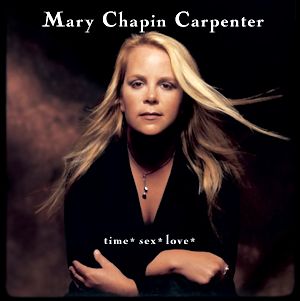 |
She recently lost a mentor Eudora Welty at 92, a canine touring companion and had a brush with death during the New York City kamikaze bombings. Mary Chapin Carpenter also pulled two leg muscles and twice had surgery - first for a herniated disc in her back and later a knee, forcing her to play concerts from a chair. But on the tempestuous trapeze of turmoil Carpenter recovered from the end of a four- year romance, swooped down and found a new fiancée and belatedly cut her eighth album in a 15-year recording career. Carpenter, 43 and single, saw life rushing by and slammed on a heart-brake to ensure she enjoyed and chronicled all the peaks and troughs on her concept disc Time, Sex, Love. |
The singer fleshes out her middle age mistress piece in three parts - “Time is the great gift/ Sex is the great equaliser/ Love Is The Great Mystery.”
But it's The Long Way Home - previewed last year on her second Australian tour that catalysed this classic
Carpenter paints vitriolic vignettes of male and female leads, seduced by success and blind to reality and history of the journey - “Accidents and inspiration lead you to your destination.”
You all know so many of these myopic, materialistic maniacs.
“They feel they can script their lives and know exactly where they're going,” Carpenter revealed recently.
“And that scripting, that sense of having it all wrapped up, absolutely depresses me.”
The singer advises protagonists to “roll down your window/ turn off your phone/ see your life as a gift from the great unknown/ and your task is to receive it/ tell your kid a story/ hold your lover tight/ make a joyful noise/ swim naked at night/ read a poem a day/ call in well sometimes/ and laugh when they believe it.”
This is trusty therapy provided free with every purchase of Time, Sex, Love .
Carpenter kicks off with the hedonistic escape of Whenever You're Ready - a co-write with former Pure Prairie League singer Gary Burr and cool contrast to new age parody Simple Life .
She covers all mood swings - from a surrealistic swing back to an old lover in her co-write with Kim Richey on Swept Away to the perilous plunge into abandon to a new love in the inherent danger of the angst anchored Slave To The Beauty.
The singer concedes that the end of a four-year romance fuelled her moroseness - in co-writes with Burr on Maybe World and What Was It Like.
“The idea of starting over, it's not so much frightening but it's exhausting,” Carpenter says.
“And even if you summon up the optimism that, you know, I'll be able to meet someone else - if that is indeed what you want, and certainly in my case I wanted that - you just have to take so much on faith.”
Carpenter's journey is not all tragedy on that long, lost highway - her slipper is driven deep into the villain in King Of Love before her hearty heroine escapes in P. S This Is Me Leaving You , written ironically with former lover and co-producer John Jennings.
She throws an ethereal cloak over Someone Else's Prayer (the Rome rooted song that broke a five year writer's block) and The Dreaming Road .
It's an eerie entree to the surrealistic pillow of Alone But Not Lonely and The Long Way Home .
But at the end of Chapin's journey there is solace - In The Name Of Love and Late For Your Life .
“Now you might never find that perfect town/ but the sun still sets on a roof top where the city sounds like a Gershwin clarinet/ and you might be searching every face for one you can't forget.”
Carpenter says she wanted to enjoy herself recording at London's Air Studio with co-producers Jennings and Blake Chancey (of Dixie Chicks fame), bassist Glenn Worf, drummer Dave Mattacks, pianist Steve Nathan, Jon Carroll on organ and Duke Levine and Jennings sharing electric and slide guitar, sitar and mandolin.
Hidden track Going Home , with uncharacteristic outbreaks of joy and hilarity, indicate the artist broke her own morose mold when the task was done.
Now, all Mary Chapin needs, is airplay in the unlucky radio country and beyond.
When the artist made her last Australian tour - in the wake of her creative compilation Party Doll & Other Favorites - she pulled a modest but enthusiastic crowd at St Kilda Palais.
Perhaps the timing was wrong - a level radio and TV playing field giving exposure to Carpenter and many other cerebral country chanteuses such as Lucy Kaplansky, Kim Richey, Trisha Yearwood, Marshall Chapman, Gretchen Peters, Matraca Berg, Leslie Satcher, Lucinda Williams, Rhonda Vincent and Alison Krauss is a dream which may never break free from nightmare here.